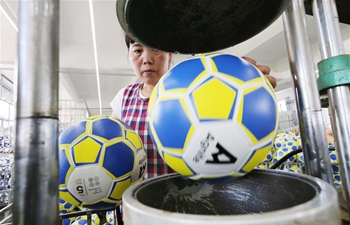WASHINGTON, May 16 (Xinhua) -- Researchers from the University of Chicago Medicine showed that bacterial signals might be a precursor condition to leukemia, which can be detected 10 to 15 years before the cancer develops.
A new study published on Wednesday in the journal Nature revealed that the bacterial infection was induced in this case by the disrupted intestinal barrier and went usually without pathogens.
According to the researchers, over 15 percent of people over the age of 60 develop TET2 mutations in hematopoietic stem cells that give rise to other blood cells, and those mutations give the hematopoietic stem cells a competitive advantage over others, so they begin to proliferate and make up a greater percentage of cells that become white blood cells.
This is a condition known as clonal hematopoiesis of indeterminate potential, or CHIP, which can lead to a precursor condition to leukemia called pre-leukemic myeloproliferation.
The new study, working on mice, has shown that progression from CHIP to pre-leukemic myeloproliferation is dependent on bacterial signals from bacteria normally present in the gut that spread to peripheral organs.
The study demonstrated that loss of TET2 expression (in case of TET2 mutation) leads to defects in the intestinal barrier, allowing bacteria living in the gut, otherwise not pathogenic, to spread into the blood and peripheral organs.
The spread of bacteria leads to the release of inflammatory molecules in the blood, which in turn promote the proliferation of hematopoietic stem cells that lack TET2 expression. This sets the stage for pre-leukemic myeloproliferation.
"Years before a patient develops cancer, there are changes happening in the background. They still appear healthy until they reach a tipping point," said Bana Jabri, professor and vice chair for research in the Department of Medicine at University of Chicago and the senior author of the study.
Genetic screening can detect TET2 mutations and early signs of changes in hematopoietic stem cells 10 to 15 years before cancer develops.
This means that treatments to block the bacterial signals could reverse pre-leukemic myeloproliferation and limit the risk for developing cancer.
















